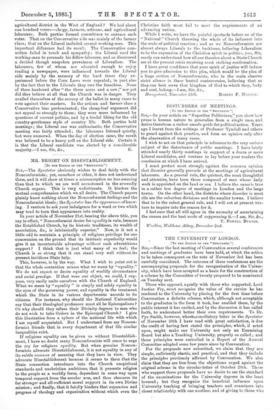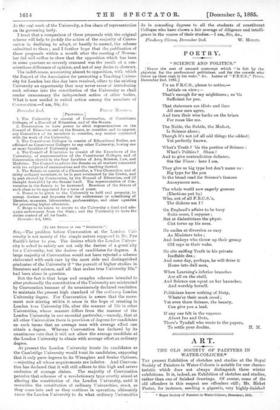THE UNIVERSITY OF LONDON.
rTo THE EDITOR OF TEE "SPECTATOR."] Sin,—Since the last meeting of Convocation several conferences and meetings of graduates have been held, at which the action to be taken consequent on the vote of November 3rd has been carefully considered. The outcome of these conferences are the accompanying proposals for the reorganisation of the Univer- sity, which have been accepted as a basis for the construction of a scheme by the Committee of twenty proposed to be nominated on Tuesday next.
Those who opposed, equally with those who supported, Lord Justice Fry, must recognise the value of the service he has rendered to the University by placing for the first time before Convocation a definite scheme, which, although not acceptable to the graduates in the form it took, has enabled them, by the public interest it has excited, and by the discussion it has called forth, to understand better their own requirements. To Dr. Pye Smith, however, whoievonciliatory letter in the Spectator of November 28th I have read with great satisfaction, is due the credit of having first stated the principles, which, if acted upon, might make our University not only an Examining Board but also a Teaching University, properly so called ; and these principles were embodied in a Report of the Annual Committee adopted some few years since by Convocation.
For the proposals now submitted, we claim that they are simple, sufficiently elastic, and practical, and that they include the principles previously affirmed by Convocation. We also claim that they are free from the objections urged against the original scheme in the circular-letter of October 28th. Those who support these proposals have no desire to see the standard of the examinations for the University degrees in the least lowered ; but they recognise the beneficial influence upon University teaching of bringing teachers and examiners into closer relationship with one another, and of giving to those who do the real work of the University, a due share of representation on its governing body.
I trust that a comparison of these proposals with the original scheme will help to justify the action of the majority of Convo- cation in declining to adopt, or hastily to amend, the scheme submitted to them ; and I further hope that the publication of these proposals within a month after the meeting of Novem- ber 3rd will suffice to show that the opposition which has been in some quarters so severely censured was the result of a con- scientious difference of opinion, and net of any desire to obstruct.
The indifference, amounting almost to opposition, with which the Report of the Association for promoting a Teaching Univer- sity for London has this day been received, offers to the existing University an opportunity that may never recur of introducing such reforms into the constitution of the University as shall render unnecessary the independent action of other bodies. What is now needed is united action among the members of Conrocation.—I am, Sir, &c.
[PROPOSALS.]
1. The University to consist of Convocation, of Constitnent Colleges, of a Council of Education, and of the,Senate.
2. Convocation to have power to elect representatives on the Council of Education and on the Senate, to consider, and to appoint any Committee of its members to consider, any matter connected with the work of the University. 3. The Constituent Colleges to consist of Educatiomil Bodies, not affiliated as Constituent Colleges to any other University, having one or more faculties of University rank.
4. The Council of Rlucation to consist of the Examiners of the University, of representatives of the Constituent Colleges, and of Convocation elected in the four faculties of Arts, Science, Law, and Medicine. The Council to advise the Senate on all matters connected with the subjects of examinations and the teaching thereof. 5. The Senate to consist of a Chancellor, a Vice-Chancellor, and of thirty ordinary members, to be in part nominated by the Crown, and in part elected by Convocation, by the Council of Education, and (if thought desirable) by the Senate itself. The representation of Con- vocation in the Senate to be increased. Members of the Senate of each class to be appointed for a term of years. 6. Power to be given to the University to hold real property, to accept devises and bequests for the endowment or subsidising of libraries, museums laboratories, professorships, and other agencies for promoting higher education. 7. Steps to be taken to secure to the University a fixed and ade- quate endowment from the State ; and the University to have the entire control of all its funds.
December 1st, 1885.







































 Previous page
Previous page